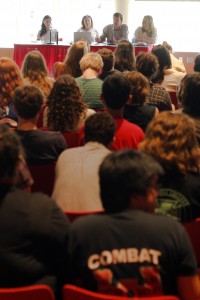
By Alex Claxton
claxtonc@grinnell.edu
Monday’s panel discussion “Putin’s Russia and the Trial of Pussy Riot” covered issues relating to the Russian punk-rock band, their treatment by the Russian government and the recent global controversy surrounding it.
Russian professor Kelly Herold believes that Pussy Riot’s singular nature is a key part of why the issue has gained such traction.
“It was just part of the general protests in Russia … This is just one of the things that happened. Why did it become the thing that people were arrested for and put into prison?” Herold asked.
On February 21, members of the group held a protest, or so-called “punk rock prayer” denouncing Vladimir Putin, President of Russia, in Moscow’s Cathedral of Christ the Saviour. The prayer’s refrain translates to “Mother of God, chase Putin away!”
After the band was sentenced to two years in prison on the account of hooliganism motivated by religious hatred, Western leaders spoke out in support of Pussy Riot, thus catapulting the group into international notoriety.
Considering Grinnell College’s long history of social activism it seemed only natural for an in-depth discussion of the controversy to take place. And so, last Monday, students and professors filed into JRC 101 to take part in an interdisciplinary dialogue that delved deep into subjects such as feminism, Russian politics and protest culture.
Four professors from a variety of departments around campus spoke at the event—Edward Cohn, History; Kelly Herold, Russian; Astrid Henry, Gender, Women’s and Sexuality Studies and Danielle Lussier, Political Science.
Each professor represented a different background, but the message from each was clear—Pussy Riot’s presence on the international political scene is significant as well as unique.
Henry began the talk by discussing Pussy Riot’s roots in riot grrrl culture, third wave feminism, and punk rock music. Henry connected the dots between these distinct subcultures and Pussy Riot’s ethos by illustrating each group’s emphasis on ownership. She cited third wave feminism’s insistence on ownership of one’s own sexuality, anger, and humor—a concept the members of Pussy Riot have clearly taken to heart.
Next, Cohn illustrated just how shocking Pussy Riot’s actions were by describing the long and intertwined history of the Russian government and Orthodox Church.
Cohn explained how the Church of Christ the Savior was built to represent the resurgence of religion in Russian society while also celebrating Russia’s past and present political leaders. Pussy Riot’s actions, timing and words were all specifically intended to push the buttons of as many Russians as possible.
Lussier explained the political situation in Russia, and how similar protests have been going on in Russia for almost a year now. At first, the Russian government seemed to be taking a more lenient stance towards the protesters—large-scale arrests and sentences were uncommon. However, as exemplified by the Pussy Riot trial, crackdowns became more common as the year wore on.
As for Russian public opinion regarding Pussy Riot’s sentencing, Lussier provided statistics revealing that while most Russians believe punishment was necessary, many think the sentence to be overly harsh.
“I think the role of technology is very important in this,” Lussier said, later, when asked why Pussy Riot has received so much attention outside of Russia. “The truth of the matter is just watching the performance, even if you don’t understand it, … is visceral in it’s own way. And I think that resonated with people.”
Kelly Herold had similar comments regarding Pussy Riot’s technological uniqueness.
“[The protest] was truly a punk feminist act,” Herold said.
At the panel, Herold spoke about how even current Russian intellectuals look down upon Pussy Riot’s actions simply because the members are women. Herold gave the example of how Alexey Navalny, perhaps Russia’s most prominent liberal activist, referred to the members of Pussy Riot as girls and called their actions stupid.
The professors spoke to a packed house. Among this group was Austin McKenney ’15. He was initially attracted to the Pussy Riot story because he identified with the group’s core ethos, but found the group had a broader, more international appeal.
“I really, really like punk music and riot grrl music, but I find that it is [primarily] an American based movement,” he said. “When I see groups like this … in different countries, I always found them really exciting, especially in countries as politically nebulous as Russia.”
Sentiments regarding the panel have been quite positive. McKenney found it incredibly informative, citing his enhanced “perspective on our government and our stance on freedom of expression.”
Danielle Lussier was also upbeat about the actual talk, emphasizing the broad range of disciplines represented on the panel. She did, however, have some misgivings about the question-and-answer session following the talk.
“I was expecting a lot more questions from students, so that made me a little bit curious as to what the reaction was in the audience,” Lussier said.

















































